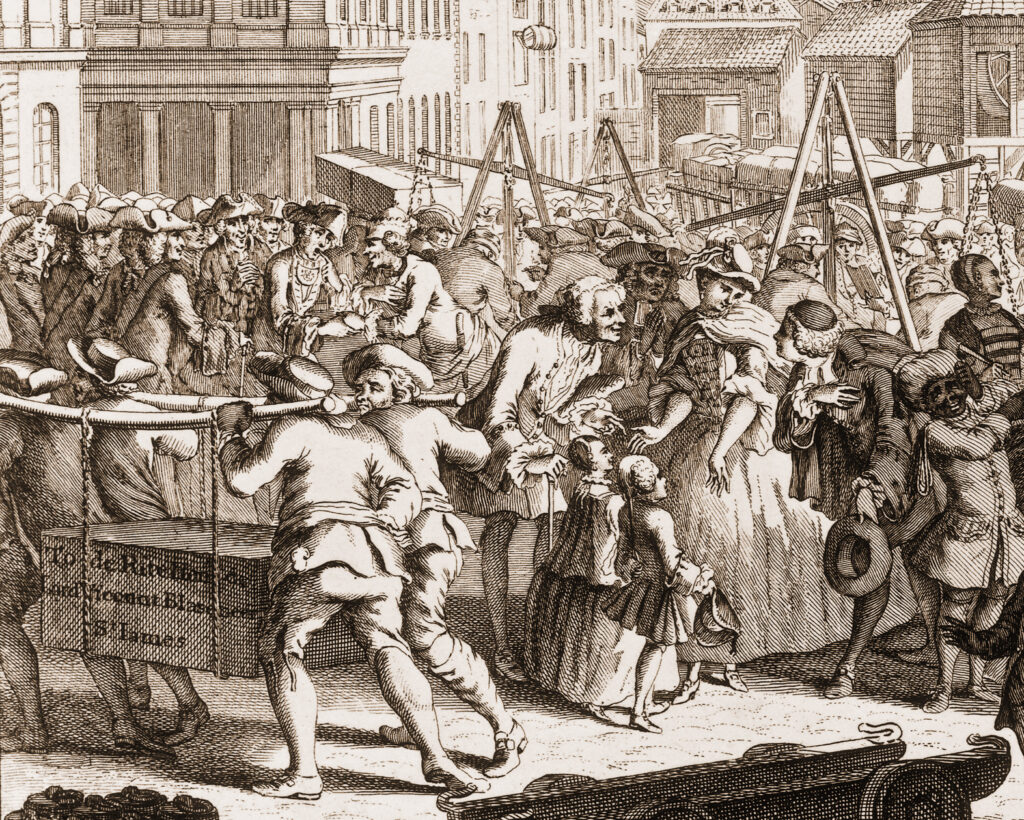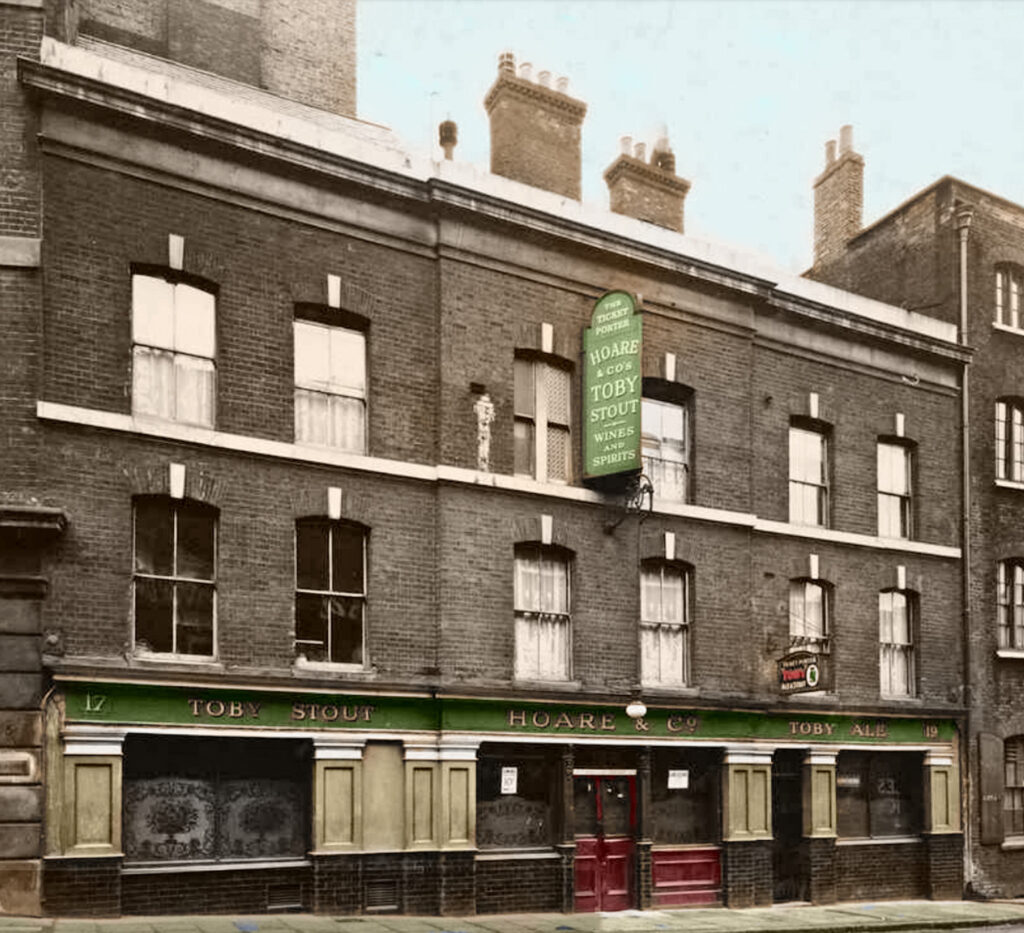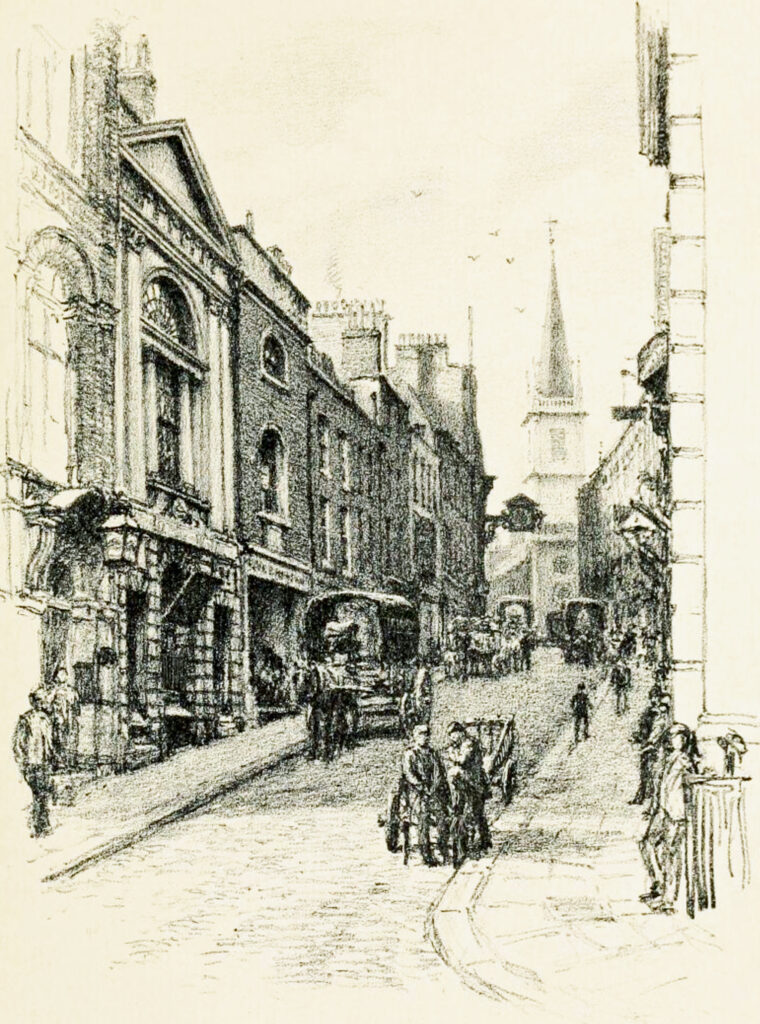I’ve never met Larry Hatch, but I’m sure he’s a great guy: kind to small animals, regularly helps old ladies cross the road safely, buys great bagloads of girl guide cookies. However, he’s written some dumb nonsense about porter, and I’m feeling grumpy, so he’s going to get a kicking.
I bought his publication Hatch’s Guide to Porters Stouts and Barleywines, part of the BrewBase reviews series, back in 2018 because I was trying to track developments in porters and stouts over the past 30 years—when DID someone first add actual coffee to stout to make a coffee stout, and who was it?—but I never got round to reading it that thoroughly. It was only when I was arguing with someone last weekend who was trying to promote the stupid idea that the name “porter” comes from the Dutch “poorter“, and I started digging around to try to find out who was the first person to come up with THAT speciously moronic suggestion, that I discovered Mr Hatch was one of those promoting this bollix.

On pages 21 and 22 of the Guide to Porters, written in 2017, he declares that porter was “generally thought to have come from England … That history now appears to be wrong. It is now more likely that London Porter of [the] 1720s and likely before was a name corrupted from the Dutch Poorter (with two o’s) known since the 14th century and almost surely coming to the UK during the centuries of healthy trade between those two great trading nations.”
What, I’m sure you are asking, has this drivel got to do with QAnon? Well, it’s because believing that porter as brewed in London in the early 18th century could possibly be derived from a beer called poorter brewed in the Low Countries in the 14th century is a collapse of the critical faculties, an inability to assess the evidence and judge its likelihood, a breakdown in logic, a failure to properly weigh up competing possibilities and sift the probable from the improbable, a disastrous misunderstanding of the importance of Ockham’s razor, of exactly the same kin and kind that leads people to believe baseless conspiracy theories involving pizza restaurants and child abuse rings, to insist that, despite all the irrefutable evidence to the contrary, the Earth is flat, and to claim that the Moon landings were faked by Stanley Kubrick in a Hollywood studio.
I have wondered for a long time, as I am sure you have, why obviously intelligent people are sometimes able to believe clearly illogical nonsense which, if they thought hard enough about it, they would surely be able to see cannot possibly be true. If Stanley Kubrick had faked the Moon landings, hundreds – thousands – of people would have had to be in on the conspiracy. It is impossible that not one of those people has come forward in 50 years to cash in on the fortune they would surely make from revealing all. If the Earth were flat, even ignoring the conspiracy there would have to be among airline pilots (and airline passengers) about flights across the South Pacific being four or five times longer than they would be on a globe, were our planet actually laid out on a plate like the United Nations flag, the night sky in India would look upside-down compared to the night sky in the United States, while the constellation of Orion would look the same way up in Buenos Aires as it does in Boston. It doesn’t.
It’s my theory that we humans assess the likelihood of claimed statements largely subconsciously, judging and weighing possibilities, the chances for and against chains of causation, and the odds for and against A being the reason for B without doing too much of this in the conscious foreground. Evolution has made us almost unbelievably good at performing amazing feats of calculation and deduction unconsciously without realising that we are doing it. If I throw a tennis ball to you, your brain will calculate the ball’s likely speed and trajectory based on a fleeting glimpse of initial position and angle of release and, taking gravity and wind resistance into account, it will move your muscles to position your hand right in the path of the ball, so that you can catch it. You are not aware of any of that calculating, or how you do it – you just catch the ball. The baseball player Joe DiMaggio once caught a well-struck 450-foot hit at Yankee Stadium after only a couple of brief glances at the flying ball, taking off at the crack of bat and running 30 yards to the spot that the part of his brain involved in such calculations had worked out would be the target, putting his left arm up without looking, to take the ball out of the air. The crowd cheered for several minutes.
Evolution honed that skill, of course: you can catch a ball because your ancestors were great at catching small plump birds as they tried to fly off, and you can hit a cover drive to the boundary because your ancestors evolved the ability to whack flying birds and speeding small furry animals with clubs. Good at catching or hitting potential food, good at surviving, good at having lots of offspring.
Similarly, our ancestors learned to evaluate possibilities swiftly and unconsciously without spending too much time doing it front-of-mind. If you’re creeping through the jungle and you hear a twig snap behind you, time wasted evaluating the chances of that sound indicating a threat is time spent standing in the path of possible death. Best to do that evaluation swiftly and unconsciously, and leap up into a handy tree.
The point I am attempting to make is that humanity evolved an ability unconsciously to work out and decide whether something is true or not, whether it makes sense, a “gut instinct” about the veracity of a given proposal, instinct, of course, not really being anything to do with it: instead it is the rapid unconscious survey and review of the available evidence, coupled with an unconscious acceptance or rejection of possible answers, based on whether the chain that leads to the proffered conclusion is both logical and likely or otherwise; that likelihood being founded, I suggest, pretty firmly on the principles articulated by William of Ockham (one of my personal heroes) – that the simplest explanation is generally the best one. Thus the Earth is round, the moon landings really happened and porter is named after those members of the London working classes who were street and quayside porters, because other explanations are over-complicated, illogical and either unlikely or actually impossible.

Of course, having a “gut instinct” that something is or is not true, after our subconscious minds have reviewed the evidence and decided whether the arguments hold up, does not absolve us of the need to muster the evidence for others to review, because other people cannot interrogate our subconsciouses. The evidence for the two sides of the “porter name origins” argument is pretty easy to line up. Backing the “porter is named for the Ticket Porters and Fellowship Porters who worked the streets and quaysides of Old London Town” argument we have:
● The Swiss traveller César-François de Saussure, who visited London in the 1720s, wrote that the black beer of London was “ connue sous le nom de porter, c’est-à-dire porteur, parce que les porteurs ou portefaix, & tout le petit peuple, en boit beaucoup,” in English (my translation): “known under the name of ‘porter,’ that is to say, ‘carrier,’ because porters or goods-carriers, and all the little people, drink it a lot.” (Admittedly De Saussure did not actually write this down until the 1740s, pretending his narrative was composed as letters to a friend 20 years earlier, but it was clearly something he had been told on one of his visits to London and must be regarded as good contemporary evidence.)
● Independently of De Saussure, the anonymous London brewery worker calling himself “Obadiah Poundage”, who was born, so he claimed, in 1674, and thus in his 40s when porter was being developed, and perfectly placed to know the truth, wrote in 1760 that when the beer first went on sale “The labouring people, porters, &c found its utility; from whence came its appellation of Porter.“
● Daniel Defoe wrote in 1724 of porter being a working-class, alehouse drink
● We have records of porters not only drinking porter – see the book The Conduct and Scandalous Behaviour of the Porters in Exchange Alley, published 1750, for example – but drinking it in vast amounts. A doctor in 1826 wrote that it was “no uncommon circumstance” for porters “to consume 6, 8, 10 and 12 pots of porter a day, besides gin and a full allowance of animal food,” a pot being a quart, or two pints, meaning one porter might drink three gallons of beer in perhaps 14 hours
Thus even if we did not have De Saussure and Poundage as witnesses, the evidence is excellent that porters were known for drinking porter, and it’s a plausible conclusion that this association was the reason why porter became known as porter. It makes sense. It’s logical. It’s simple. It chimes.

The evidence for the name “porter” coming from “Poorter”, on the other hand, is that
● There was a Dutch beer called Poorter, in the 14th century (except that “poorter” is the old Dutch word for “burgher”, and the references to poorter bier are to do with burghers’ brewing rights, so “poorter” was not a beer style per se …)
● Several Dutch beer words entered the English language because of the involvement of immigrants from the Low Countries in brewing beer in England, words such as firkin, gyle, and even “beer” itself.
● Err …
● That’s it
There are NO suggestions before the 21st century that poorter and porter had any links, and worse, there is no reasonable journey for a 14th century Dutch beer name to become an 18th century English beer name. It doesn’t make sense. It’s illogical. It doesn’t chime.
Yet people still support this nonsense, and put it into their books, thus exposing their inability to think logically, to spot the flaws in an argument. Another book making a different but equally stupid claim for the roots of the word “porter” came out only in 2018. Its author declares that the name came about because the alleged inventor of porter, Ralph Harwood of Shoreditch (and we’ve debunked him here already) “would send porters around to people’s houses carrying his beer and on arrival they would shout ‘Porter’, meaning themselves rather than the beer, but the name stuck.”
A moment’s thought should have shown that, even ignoring the utter lack of evidence for this story, it is monstrously absurd. Porters delivered a huge variety of goods around London: basically, almost anything and everything. Why should their name have stuck to just one item they (supposedly) delivered? In any case, beer was probably one item porters did NOT deliver, that being the job of specialist draymen using horses and drays, or carrying a cask suspended by chains from a yoke. It should have taken only a moment for that author’s subconscious to tap him on the forehead and say: “Oi – that doesn’t make sense! Have another go …”



Very interesting!
I thoroughly enjoyed this. One of your best. You should write while grumpy more often.
Please don’t encourage that!
I ALWAYS write when I’m grumpy. It’s my permanent setting, and has been for many decades.
And that is why you and Ronald Pattinson are my favourite beer authors (you perhaps in a better literary sense), because you both take time to search your sources, to present them and to show that these sources have their roots in real history.
That hole in your argument hasn’t healed yet…
Please elaborate.
Rod – Ted is a firm supporter of the “porters shouted ‘Porter!’ when they delivered the beer” theory for the name, despite the fact that he is unable to supply any evidence that porters ever delivered a drop of any sort of beer of any shade. Best just to say “Yes, dear”, and carry on …
Yes indeed.
The people who did walk round the streets carrying (relatively) small amounts of Porter for sale were potboys, not porters. As we know, they would carry eight or ten pewter quart pots in special wooden holders to sell in the street, often to thirsty, er, porters who had stopped for a rest and a drink. In “Beer Street”, Hogarth shows a porter who has put down a heavy basket of books drinking a quart pot of Porter, which he may well have bought from a potboy.
Apart from domestic deliveries of barrels of Porter by dray, it is conceivable that smaller deliveries of pots of Porter could have been made by potboys coming from a nearby pub. When they arrived with the beer, surely they would have cried out “potboy!”, so that, following Brunning’s logic, the beer would have acquired the name “Potboy”, as in “Landlord, a quart of your finest Potboy, and please to draw it mild.”
Well laid out!
REM 1989 – “If you believe, they put a man on the moon…..If you believe, there’s nothing up my sleeve and nothing is cool”
Had to do it Martyn….LOL
I believe what you’re saying about the word “porter”, although drinking three gallons of anything seems like a stretch.
Thank you Martyn for this great piece of writing…! I love it…
There is so much nonsense written by all those pseudo-beer-historians…!
I think, just possibly, porters, when they weren’t carrying stuff, went into porterhouses, drank porter, and ate porterhouse steaks ( they, like modern black cabbies, were quite well paid).
> There was a Dutch beer called Poorter, in the 14th century
While I’m sure you’ve nailed the proper derivation of Porter, it would be interesting to know more about this beer style called Pooter. Any ideas?
(Also, minor typo: on arrival they would should ‘Porter’)
I mean Poorter
Good to see you’ve been a victim of Muphry’s (sic) Law – “Any complaint about a grammatical or typographical error will itself contain a grammatical or typographical error.” Thank you for pointing out I typed “should” instead of “shout”, already corrected …
On the origins of “poorter, Roel Mulder explains all here: https://zythophile.co.uk/2015/06/05/the-three-threads-mystery-and-the-birth-of-porter-the-answer-is/#comment-13129
Great read Martyn and well argued. In addition to your points on the Moon Landing, at the time of the moon landings the US and Soviet Union were engaged in a bitter cold war. If the radio signals from the Apollo crew had not been coming from the moon then Soviets would have told the world.
Martyn, nice post! Given your curiosity on why people believe conspiracy theories and act irrationally, I thought you might enjoy this book: https://www.goodreads.com/book/show/1051446.Irrationality
It was a great read for me, interested in similar topics on reasoning.
OK, I understand the entertainment value of hyperbole and that Q-Anon is much in the news, but your title! I suggest “… is only a short step from believing Ralph Harwood invented porter as a substitute for three-threads.”
My corollary to Goodwin’s Law: “as an online discussion grows longer, the probability of a comparison involving Q-Anon approaches 1”
Oh man, the beer history discussions I’ve had with this kind of people. For one, they never seem capable of admitting they’re wrong on even the tiniest detail, even if you wave the evidence in their face. There was this person who kept insisting that 17th century Antwerp citizens had their beer brewed in London, England, just because he didn’t understand that there was a brewery in Antwerp simply called ‘London’. To these people, facts are just annoying bugs that you can wave away if you don’t like them.
Luckily, these people are the exception. In beer land I’ve met an overwhelming majority of rational people who follow logic and consider the evidence; opinions may differ but at least there’s a common ground of what it is we’re interpreting.
Just looked in my 988 page nederlands-engels woordenboek and “Poorter” has only one meaning, that is “Burgher”.
[…] Chop and Brew talks with Aaron Herman (Arbeiter Brewing Company) and Nick Walby (Fair State Brewing Cooperative) about dip hopping […]
[…] Chop and Brew talks with Aaron Herman (Arbeiter Brewing Company) and Nick Walby (Fair State Brewing Cooperative) about dip hopping […]
BTW was porter beer or ale???
Quote from Defoe is: “I have often disguiss’d myself for this purpose, and mingl’d in among the Mob of such Fellows as those, who we call Footmen; I have convers’d with them over a Mug of Porter, as they call their Alehouse Beer and Ale”.
Pardon but where is the statement that porter was “a working-class drink”?
It is implied.
A footman is a servant, and alehouses were working class establishments.